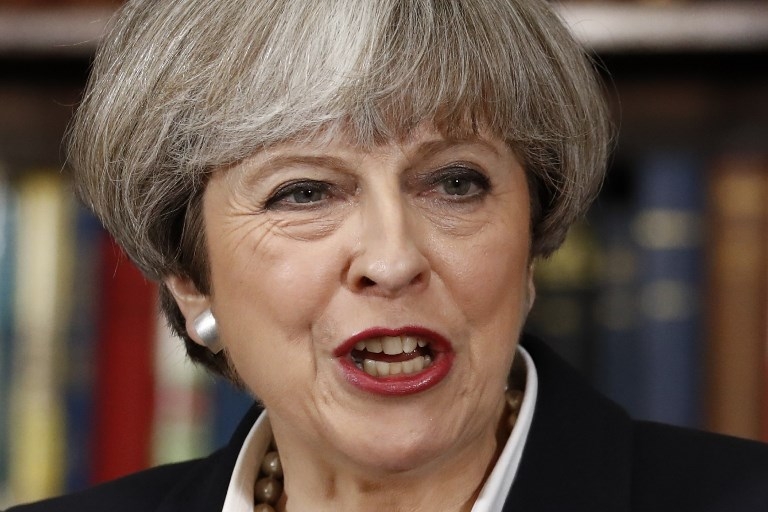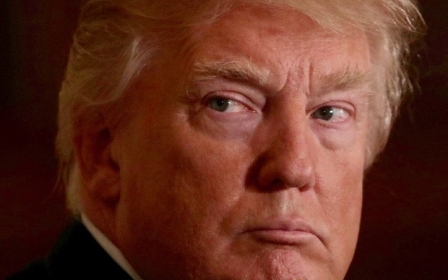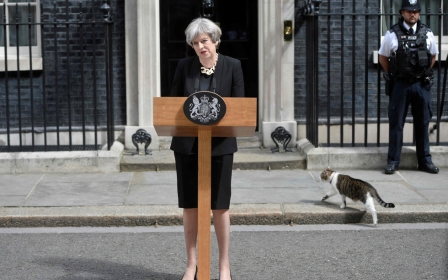Theresa May, you know that 'enough is enough' is just not enough

In her speech on Monday, Theresa May sought to present herself as a strong leader capable of coping with the threat of terrorism.
Will she get away with it?
May was home secretary for six years, from 2010 to 2016, and has famously taken an intense interest in security matters since becoming prime minister.
The Westminster, Manchester and London Bridge atrocities all took place on her watch. She has questions to answer.
No wonder that the prime minister is doing her best to distract attention by announcing a new approach to security.
Her assertion that "enough is enough" recalls Tony Blair's protestation that "the rules of the game are changing", made in response to the London bombings of 7 July 2005.
This is not reassuring. Tony Blair unfairly targeted law-abiding Muslims. May's instant reaction to the horror in London over the weekend does the same.
May's mix up
May declared that "we must do more - much more - to take on and defeat the evil ideology of Islamist extremism that preaches hatred, sows division and promotes sectarianism".
The remark sounded strong. It is actually weak and dangerous. The main problem is that May is mixing up the problem of terrorist violence with conservative social attitudes towards gender, clothing, sex and so forth.
May appears to be signalling that she wants to impose some form of collective punishment on thousands of patriotic, law-abiding British Muslims
To put it another way, May is planning to define non-violent people who hold opinions and behaviour that are deemed to be unacceptable by the British state as "Islamist extremists".
This takes us down the route towards authoritarianism.
Even worse than that, May appears to be signalling that she wants to impose some form of collective punishment on the tens of thousands of patriotic, law-abiding British Muslims for the evil atrocities carried out over the last few weeks.
This would be a profoundly un-British thing to do. We have a history of tolerance. That means that we have allowed people to do or say what they like so long as they do not threaten others.
Furthermore, May's new strategy won’t work. Oddly enough, I think that she must know this.
Abandoning common sense
For six years at the Home Office, the domestic security service MI5 reported to her. This organisation has seen off countless plots and averted very serious atrocities.
Its officers have an especially acute understanding of the need to have good relations with the Muslim community.
May's new strategy won’t work. Oddly enough, I think that she must know this
The last thing they want is for the British state to criminalise law-abiding Muslims, not for violent acts, but for how they think or dress.
This prudent advice she received from MI5 explains why, as home secretary, she was often a thorn in the flesh of neoconservatives like Michael Gove, David Cameron and George Osborne.
This clash of opinions came to a head during the so-called Trojan Horse plot in Birmingham three years ago.
Michael Gove secured the support of Downing Street in his campaign to stigmatise so-called "Islamist" teachers in the Park View schools in West Birmingham.
The ensuing cabinet clash led to a rupture between May and David Cameron. One of her special advisers, Nick Timothy, was struck off the Tory candidate list, and another, Fiona Hill, was forced to resign.
Under pressure of an impending general election, May appears to have abandoned her commonsensical approach to counter terrorism.
How we define leadership
Her response will cause despair among MI5 and Special Branch officers whose job it is to head off terror attacks. It is no coincidence that Richard Barrett, a former intelligence officer with many years experience of fighting terrorism, warned on Monday that May’s new policy could "easily make things worse".
During the course of May's speech, she repeatedly claimed that only she possessed the leadership Britain needed to combat terror.
We all need to ponder whether leadership really is the same as violent and impulsive action leading to murderous and counter-productive results
We need to re-examine the way leadership is understood in democratic countries like Britain. Recent acts of "leadership" include Tony Blair's decision to invade Iraq in 2003, and David Cameron's campaign to bring down Colonel Gaddafi in Libya in 2011.
Jeremy Corbyn, by contrast, opposed both these projects, and gets marked down as some kind of wimp who is not to be trusted on foreign policy.
We all need to ponder whether leadership really is the same as violent and impulsive action leading to murderous and counter-productive results.
With three days to go to a general election, Theresa May has politicised the London Bridge and Manchester tragedies. It’s understandable why May reacted as she did.
One fears that Sir Lynton Crosby, the famed political strategist who is advising May, had a great deal to do with this decision.
Twelve months ago, David Cameron’s Tories took the advice of Sir Lynton and used Muslim extremism and the threat of terror to try and destroy the mayoral ambitions of Sadiq Khan. Something of the same may be happening again.
Let’s hope that May comes to her senses after election day.
- Peter Oborne was named freelancer of the year in 2016 and again in 2017 by the Online Media Awards for an articles he wrote for Middle East Eye. He was British Press Awards Columnist of the Year 2013. He resigned as chief political columnist of the Daily Telegraph in 2015. His books include The Triumph of the Political Class, The Rise of Political Lying, and Why the West is Wrong about Nuclear Iran.
The views expressed in this article belong to the author and do not necessarily reflect the editorial policy of Middle East Eye.
Photo: Britain's Prime Minister and leader of the Conservative Party Theresa May gives a general election campaign speech at RUSI in central London on 5 June 2017 (AFP)
Middle East Eye propose une couverture et une analyse indépendantes et incomparables du Moyen-Orient, de l’Afrique du Nord et d’autres régions du monde. Pour en savoir plus sur la reprise de ce contenu et les frais qui s’appliquent, veuillez remplir ce formulaire [en anglais]. Pour en savoir plus sur MEE, cliquez ici [en anglais].




